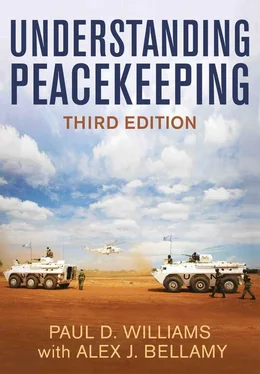1 Cover
2 Title Page Understanding Peacekeeping Third edition PAUL D. WILLIAMS WITH ALEX J. BELLAMY polity
3 Copyright Copyright © Paul D. Williams and Alex J. Bellamy 2021 The right of Paul D. Williams and Alex J. Bellamy to be identified as Authors of this Work has been asserted in accordance with the UK Copyright, Designs and Patents Act 1988. First edition published in 2004 by Polity Press Second edition published in 2010 by Polity Press This third edition first published in 2021 by Polity Press Polity Press 65 Bridge Street Cambridge CB2 1UR, UK Polity Press 101 Station Landing Suite 300 Medford, MA 02155, USA All rights reserved. Except for the quotation of short passages for the purpose of criticism and review, no part of this publication may be reproduced, stored in a retrieval system or transmitted, in any form or by any means, electronic, mechanical, photocopying, recording or otherwise, without the prior permission of the publisher. ISBN-13: 978-0-7456-8675-2 A catalogue record for this book is available from the British Library. Library of Congress Cataloging-in-Publication Data Names: Williams, Paul D., 1975- author. | Bellamy, Alex J., 1975- author. Title: Understanding peacekeeping / Paul D. Williams, with Alex J. Bellamy. Description: Third edition. | Medford, MA : Polity Press, 2021. | Includes bibliographical references and index. | Summary: “New edition of the most comprehensive introduction to the field of peacekeeping”-- Provided by publisher. Identifiers: LCCN 2020012849 (print) | LCCN 2020012850 (ebook) | ISBN 9780745686714 (hardback) | ISBN 9780745686721 (paperback) | ISBN 9780745686721 (epub) Subjects: LCSH: Peacekeeping forces. Classification: LCC JZ6374 .B45 2021 (print) | LCC JZ6374 (ebook) | DDC 341.5/84--dc23 LC record available at https://lccn.loc.gov/2020012849 LC ebook record available at https://lccn.loc.gov/2020012850 The publisher has used its best endeavours to ensure that the URLs for external websites referred to in this book are correct and active at the time of going to press. However, the publisher has no responsibility for the websites and can make no guarantee that a site will remain live or that the content is or will remain appropriate. Every effort has been made to trace all copyright holders, but if any have been overlooked the publisher will be pleased to include any necessary credits in any subsequent reprint or edition. For further information on Polity, visit our website: politybooks.com
4 Abbreviations
5 Acknowledgements
6 Introduction Peacekeeping in global politics Enduring themes Structure of the book
7 Part I Concepts and Issues 1 Peace Operations in Global Politics 1.1 Westphalian and post-Westphalian order 1.2 Theorizing peace operations in global politics 1.3 The impacts of peace operations on armed conflict Conclusion 2 Who Deploys Peace Operations? 2.1 The universe of modern peace operations 2.2 States as peacekeepers 2.3 International organizations as peacekeepers 2.4 United Nations peace operations 2.5 Partnership peacekeeping Conclusion
8 Part II Historical Development 3 Peace Operations during the Cold War 3.1 United Nations peace operations during the Cold War 3.2 Non-UN peace operations during the Cold War Conclusion 4 Peace Operations during the 1990s 4.1 The transformation of peace operations 4.2 The nature of the transformation 4.3 Failures and retreat 4.4 Lessons learned? Conclusion 5 Peace Operations in the Twenty-First Century 5.1 Peacekeeping reborn: 1999–2002 5.2 The Brahimi Report 5.3 Peace operations after the Brahimi Report 5.4 The rise of stabilization Conclusion
9 Part III The Purposes of Peace Operations 6 Prevention 6.1 Preventing violent conflict and preventive deployments 6.2 Preventive deployments in practice 6.3 The politics of preventive deployment Conclusion 7 Observation 7.1 From observation to traditional peacekeeping 7.2 Observation in practice 7.3 Problems 8 Assistance 8.1 Assisting war-to-peace transitions 8.2 Assistance in practice 8.3 Key challenges 9 Enforcement 9.1 What is peace enforcement? 9.2 Peace enforcement in practice 9.3 Key challenges 10 Stabilization 10.1 Stabilization in theory 10.2 Stabilization in practice 10.3 Key challenges for stabilization 11 Administration 11.1 Transitional administrations in theory 11.2 Transitional administrations in practice 11.3 Key challenges
10 Part IV Contemporary Challenges 12 Force Generation 12.1 The force-generation process 12.2 Why do states provide peacekeepers? Conclusion 13 Regionalization 13.1 Regionalization and trends in peace operations 13.2 The strengths and weaknesses of regional peace operations 13.3 Regional peace operations in practice Conclusion 14 Privatization 14.1 The private security industry and peace operations 14.2 The costs and benefits of privatizing peace operations 14.3 A future of privatized peace enforcement? Conclusion 15 Use of Force 15.1 The evolution of force in peace operations 15.2 Key questions about using force in peace operations Conclusion 16 Civilian Protection 16.1 The rise and evolution of POC mandates 16.2 Consequences of POC mandates 16.3 Tensions and challenges raised by POC mandates 16.4 Assessing and reforming the UN’s POC record Conclusion 17 Gender 17.1 Peace operations and the women, peace and security (WPS) agenda 17.2 Increasing women’s participation in peace operations 17.3 Sexual exploitation and abuse in peace operations Conclusion 18 Policing 18.1 The evolution of policing in peace operations 18.2 Approaches to policing in peace operations 18.3 Challenges facing police peacekeepers Conclusion 19 Organized Crime 19.1 Organized crime and peace operations: growing convergence 19.2 Peacekeepers and organized crime 19.3 Responding to organized crime Conclusion 20 Exit 20.1 Exit in theory and practice 20.2 Political challenges 20.3 Operational challenges 20.4 Economic challenges Conclusion
11 Appendix
12 References
13 Index
14 End User License Agreement
1 Cover
2 Table of Contents
3 Title Page Understanding Peacekeeping Third edition PAUL D. WILLIAMS WITH ALEX J. BELLAMY polity
4 Copyright Copyright © Paul D. Williams and Alex J. Bellamy 2021 The right of Paul D. Williams and Alex J. Bellamy to be identified as Authors of this Work has been asserted in accordance with the UK Copyright, Designs and Patents Act 1988. First edition published in 2004 by Polity Press Second edition published in 2010 by Polity Press This third edition first published in 2021 by Polity Press Polity Press 65 Bridge Street Cambridge CB2 1UR, UK Polity Press 101 Station Landing Suite 300 Medford, MA 02155, USA All rights reserved. Except for the quotation of short passages for the purpose of criticism and review, no part of this publication may be reproduced, stored in a retrieval system or transmitted, in any form or by any means, electronic, mechanical, photocopying, recording or otherwise, without the prior permission of the publisher. ISBN-13: 978-0-7456-8675-2 A catalogue record for this book is available from the British Library. Library of Congress Cataloging-in-Publication Data Names: Williams, Paul D., 1975- author. | Bellamy, Alex J., 1975- author. Title: Understanding peacekeeping / Paul D. Williams, with Alex J. Bellamy. Description: Third edition. | Medford, MA : Polity Press, 2021. | Includes bibliographical references and index. | Summary: “New edition of the most comprehensive introduction to the field of peacekeeping”-- Provided by publisher. Identifiers: LCCN 2020012849 (print) | LCCN 2020012850 (ebook) | ISBN 9780745686714 (hardback) | ISBN 9780745686721 (paperback) | ISBN 9780745686721 (epub) Subjects: LCSH: Peacekeeping forces. Classification: LCC JZ6374 .B45 2021 (print) | LCC JZ6374 (ebook) | DDC 341.5/84--dc23 LC record available at https://lccn.loc.gov/2020012849 LC ebook record available at https://lccn.loc.gov/2020012850 The publisher has used its best endeavours to ensure that the URLs for external websites referred to in this book are correct and active at the time of going to press. However, the publisher has no responsibility for the websites and can make no guarantee that a site will remain live or that the content is or will remain appropriate. Every effort has been made to trace all copyright holders, but if any have been overlooked the publisher will be pleased to include any necessary credits in any subsequent reprint or edition. For further information on Polity, visit our website: politybooks.com
Читать дальше












